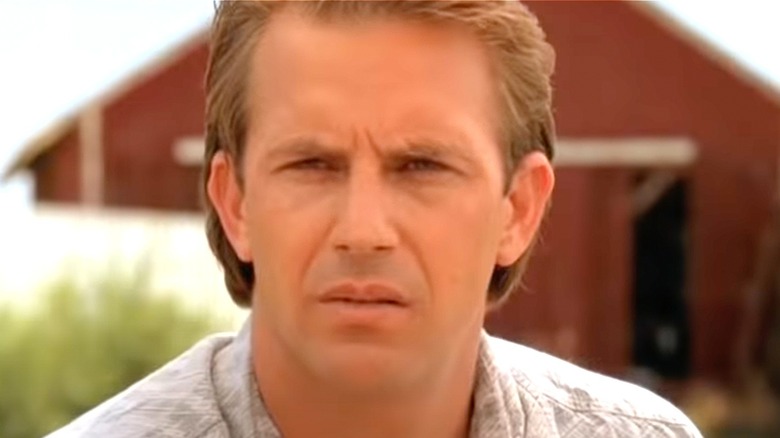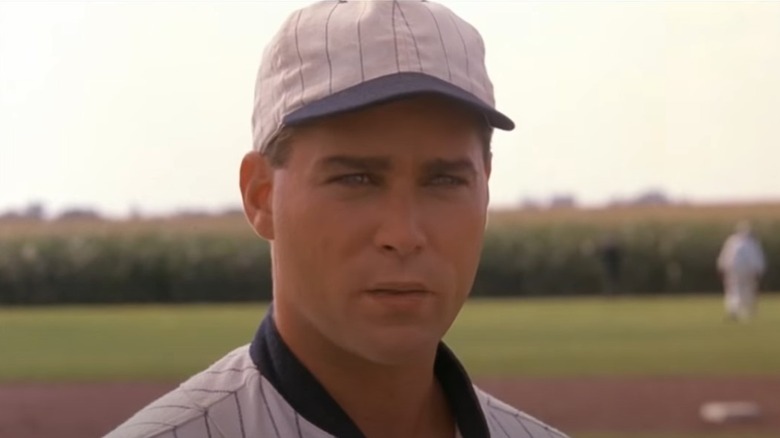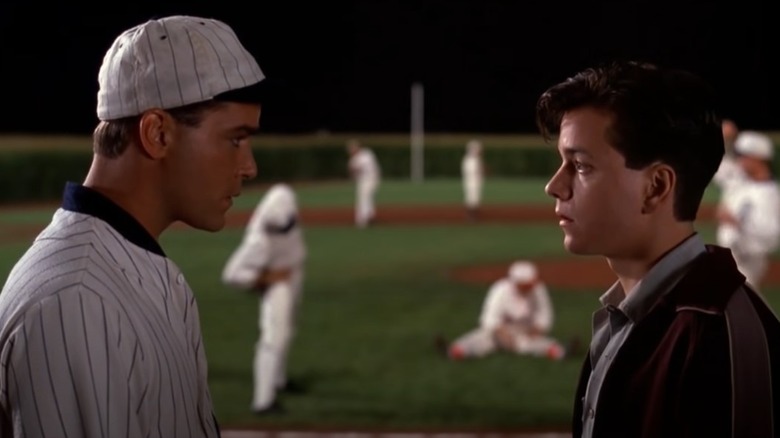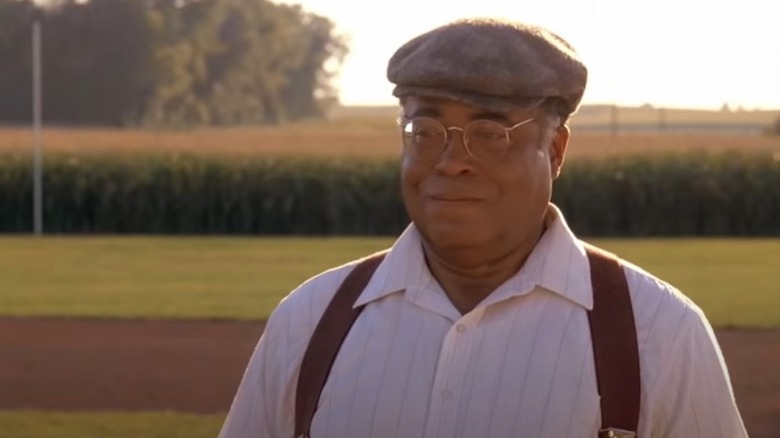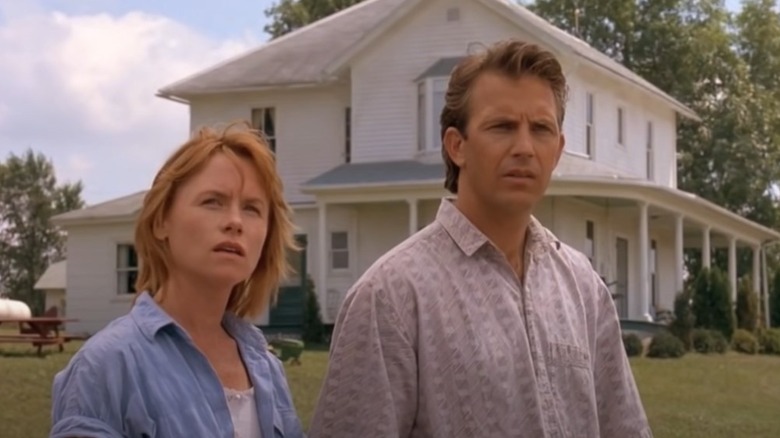The Ending Of Field Of Dreams Explained
Just in case you didn't know, Kevin Costner is the king of the baseball movie. With films like "Bull Durham," "For Love of the Game," and "The Upside of Anger," perhaps nobody in Hollywood plays a baseball player better than Costner. The fourth film in his lineup of baseball films may be his most famous, though — and that's "Field of Dreams."
The film follows Ray Kinsella (Costner), who begins to hear a mysterious voice saying one of the most famous lines in all of film, "If you build it, he will come." After Kinsella plows down his entire cornfield to build a baseball field, the real-life long-dead baseball legend Shoeless Joe Jackson (Ray Liotta) appears to take advantage of the field. Not only is he not alone — bringing along a whole group of legends to play games — but the voice also proves not to be finished with Kinsella. It sends him across the country to find Terrence Mann (James Earl Jones) and Moonlight Graham (Burt Lancaster and Frank Whaley) in a trip to ease everyone's pain.
Following the film's release, the movie's lore resulted in many baseball fans making pilgrimages to the field year after year. Today, even Major League Baseball has jumped in on the action with the "Field of Dreams" game drawing fans every year. As quickly as "Field of Dreams" reached cult status as one of the greatest baseball movies of all time, though, it's worth remembering that the film's ending is a bit ambiguous. And if you are confused about how the film wrapped up, here is all you need to know about what happened and what it means — both for the main character, and the film's versions of the real-life people he interacts with.
Shoeless Joe gets to play his game again
The 1919 Chicago White Sox were bound for the World Series with two different groups of players — one educated and better paid, while the other one was savvy and underpaid. When the notoriously cheap owner, Charles A. Comiskey, reneged on more promises made during the season, the clever and underpaid group made a deal to get revenge by throwing the series, losing on purpose for $80,000. Shoeless Joe Jackson played his heart out but found himself convicted in the court of public opinion for the fix simply because he associated with the group (a heartbreaking story explained by Bleacher Report).
On its surface, "Field of Dreams" seems to be all about giving Jackson his opportunity to play the game he loved once again. Kinsella makes his case for Jackson throughout the movie — albeit to his young daughter — to recount all the player did during the World Series, and to prove that he wasn't part of the infamous deal to fix the game. He relays the tragedy that was Jackson and feels he has done his job by returning the player to the field.
As the viewer discovers, there is more beneath the surface for the characters, but for Shoeless Joe, his purpose is to facilitate Kinsella's journey, as well as return to the field and play the game he once loved.
There was unfinished business for Moonlight Graham
Archibald "Moonlight" Graham was a real-life baseball player who spent his entire youth chasing the dream of being a major league baseball player. He found what most would consider tragedy when he played only one inning in a 1905 game for the New York Giants. In the film, it happened in 1922 and was recounted by the legendary actor, Burt Lancaster, playing an older version of the player. In the scene where Moonlight and Kinsella meet, the former lays out what would become his entire character arc and motivation. "You know we just don't recognize the most significant moments of our lives while they're happening," he says, giving the viewer an understanding of his regret. "Back then, I thought, well, there'll be other days. I didn't realize that that was the only day."
Kinsella then asks if he had one wish, what would it be, and his response is to have one at-bat against a big-league pitcher, to wink at him, then stretch a double into a triple.
After leaving, Kinsella picks up a hitchhiker (Frank Whaley), a young version of Moonlight, and takes him back to the field, where his wish comes true. While he plays a game with the legendary players, Kinsella's daughter begins choking. Moonlight steps off the field and becomes his old self again, saving her. The character's ending reveals that, while Moonlight always dreamed of professional baseball, his true purpose was to be a doctor (as he became in real-life, per the Society for American Baseball Research). He said to Kinsella when he referred to it as a tragedy, "If I'd only gotten to be a doctor for five minutes, now that would have been a tragedy." It shows that sometimes life's plan for you is grander than the dreams you have for yourself, a lesson only learned with age.
An author rediscovers the magic
With all of the behind-the-scenes rumors and mysteries behind "Field of Dreams," one of the more popular nuggets is that Terrence Mann is loosely based on legendary writer J.D. Salinger. Like the real-life inspiration, Mann is a recluse, bitter and disenchanted after a lifetime of civil rights activism. Despite his reluctance, Ray Kinsella shows up on his doorstep and convinces him to join him for a baseball game.
Mann constantly accuses Kinsella of being crazy before going to the game until he hears the voices while there. Once he believes in Kinsella and joins him on the trip back to Iowa and the baseball game, he comes to grips with his own disenchantment. He delivers a speech to Kinsella and his family while resolving the feelings surrounding his regrets and holding on to the past.
In one of the most famous monologues in movies, he says, "The one constant through all the years, Ray, has been baseball. America has rolled by like an army of steamrollers. It has been erased like a blackboard, rebuilt, and erased again. But baseball has marked the time. This field, this game: it's a part of our past, Ray. It reminds us of all that once was good, and it could be again. Oh, people will come, Ray." As Jackson invites Mann into the corn where the players appear and disappear, viewers see him laugh like a giddy child, leading us to believe he reconciled his feelings that his lifelong pursuit for a better world is possible.
A farmer finds closure with his father
Without a doubt, Ray Kinsella is the primary protagonist of the film, and the character with the most dynamic story arc. As an aging hippie, he and his wife (Amy Madigan) move from Berkley to Iowa to run a corn farm. Of course, his delusional hearing of voices throws everything into disarray as he begins collecting deceased people with regrets and sacrificing everything to bring them to reconciliation.
When Kinsella embarks on his journey, he hears three separate messages. First, the classic, "If you build it, he will come," leads him to Jackson. Then he hears, "Ease his pain," leading him to Mann. And finally, "Go the distance," leading him to Moonlight. Each of them joins Kinsella on a journey to find solace in overcoming their regret, and by the end of the film, each is a smokescreen. When driving back to Iowa, Kinsella reveals to Mann that his father had one dream — to play in the major leagues. When he failed at that dream, he forced it on his son. His biggest regret was never playing catch with his father. By the film's climax, the audience discovers all three phrases are intended for him. Building the field summoned his father for one game of catch. The pain he was meant to ease was his own. And the distance he was to travel was the journey itself.
By the film's final moments, Kinsella had found a resolution to his biggest regret, just like the three he worked so hard to help. When Jackson leaves the last time, Kinsella says, "It was you," when he realizes his father is there. Jackson responded with, "No, Ray, it was you." Thus implying that it was his own voice and his own regrets addressed throughout the film.
